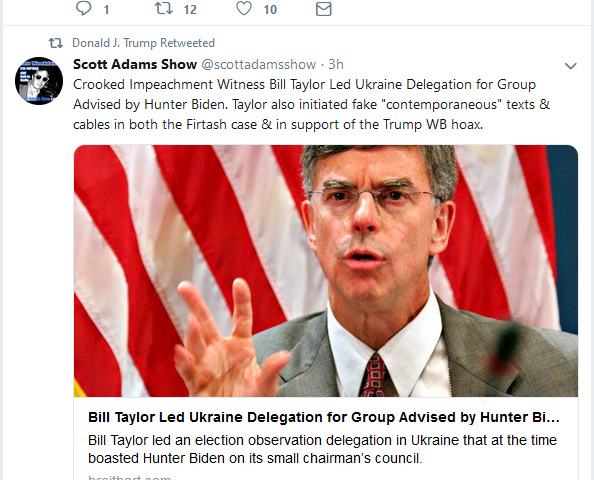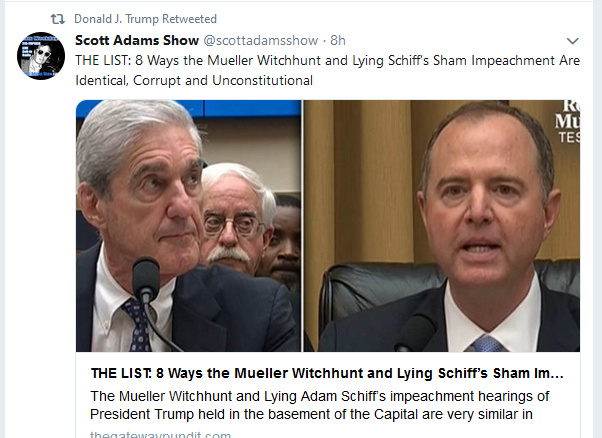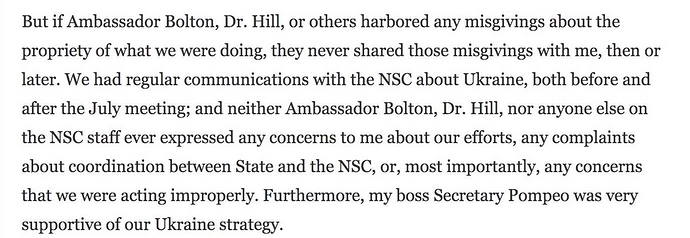As much as T wants this Impeachment “witch-hunt” to go away, the testimony has definitely not made it go away. His sychophants want him to keep low key about it…(impossible for T) and the sheer number of credible sources who will be re-testifying in front of congress is ample. Recapped below.
WSJ article in full 
WASHINGTON—Top White House officials have been urging a cautious approach to the escalating impeachment proceedings in the House, operating under the belief that because President Trump withstood the Mueller investigation he can overcome the threat posed by the latest round of scrutiny.
That circumspect White House view, in the face of growing criticism from some Republican allies, has most clearly been articulated by Jared Kushner, the president’s son-in-law and adviser and one of the few senior aides remaining in the West Wing since Robert Mueller was appointed special counsel in May 2017. Mr. Mueller’s probe of Russian election interference concluded earlier this year that the Trump campaign didn’t conspire with Moscow, but it also didn’t draw a conclusion on whether Mr. Trump obstructed justice.
What lessons do you think the White House learned from the way it handled the Mueller investigation?
But there are clear differences between the two investigations. The Mueller inquiry focused on conduct during the campaign and relied on Mr. Trump’s advisers and political operatives as witnesses, who were reluctant to participate or were under criminal investigation themselves.
Some of the most impactful testimony in the impeachment probe has come from administration officials who have worked under both Democratic and Republican presidents, serving in the military or as foreign-service officers, raising warnings about Mr. Trump’s conduct as president. And the decision to impeach, and whether to convict, is up to Congress, while Mr. Mueller said one of the reasons he didn’t reach a conclusion on obstruction of justice was a Justice Department legal opinion that forbids an indictment of a sitting president.
“It would be unfair to potentially accuse somebody of a crime when there can be no court resolution of the actual charge,” Mr. Mueller said in May.
During impeachment-related meetings inside the White House, Mr. Kushner has urged officials to remain calm, homing in on one of the president’s often repeated lines: that the impeachment inquiry is the latest in a long line of partisan attacks the West Wing has had to endure. Mr. Kushner’s message has been that the facts are in the White House’s favor, and that reduces the need to be on the defensive, according to White House officials familiar with the conversations.
Mr. Trump’s Republican allies say that the president’s interactions with Ukraine don’t rise to the level of an impeachable offense. The Republican-controlled Senate is considered unlikely to remove Mr. Trump from office even if he is impeached by the Democratic-majority House.
Mr. Trump on Monday said he wants more pressure to come from Congress, arguing allied lawmakers should defend his July phone call with Ukraine’s president, which is at the heart of the investigation, and not just attack House Democrats over the impeachment process. The president’s allies on the Hill have largely focused on criticizing procedures like closed-door testimony, rather than mounting a substantive defense of the president’s pressure on Ukraine to undertake investigations that he sought.
“I’d rather go into the details of the case rather than process,” Mr. Trump told reporters before flying to Chicago. “But process is good. But I think you ought to look at the case. And the case is very simple; it’s quick. It’s so quick.
Timeline: Interactions Between Trump’s Camp and Ukraine
President Trump’s efforts to persuade Ukraine to investigate his political rival, former Vice President Joe Biden, have set off an impeachment inquiry by House Democrats. WSJ’s Shelby Holliday lays out a timeline of interactions between the president’s inner circle and Ukrainian officials
In recent days, the White House has made moves to improve internal communications and contacts with Congress and is looking to hire an aide to help with messaging, a tacit acknowledgment that officials need to do more to deal with the rising threat to Mr. Trump’s presidency.
But they have pushed back against the notion of a formalized “war room” to anchor the response. Mick Mulvaney, the acting chief of staff, said during an Oct. 17 news conference that “you don’t have a war room when you haven’t done anything wrong.”
Mr. Trump on Friday suggested he doesn’t need additional help. “I don’t have teams. Everyone is talking about teams—I am the team.”
Outside the White House, allies of the president have been agitating for more action and responded with public criticism of the administration.
Former Trump White House strategist Steve Bannon said on his podcast last week that House Speaker Nancy Pelosi (D., Calif.) was running a “master class in political warfare” during the impeachment investigation. Rep. Matt Gaetz (R., Fla.), another staunch ally of the president, urged the White House to be more aggressive.
“I do not agree with the comments of my friend Mick Mulvaney when he says that when you prepare a war room that’s some sort of indication of guilt,” Mr. Gaetz said, adding that “we are not going to win this impeachment at a K Street martini party.”
One of the key moments of the Mueller probe for the administration was the strategizing around the final report, and the decision to issue a letter from Attorney General Bill Barr that summarized the document well in advance of the report itself. Both Republicans and Democrats acknowledged that letter successfully lowered expectations for the report.
At least one of the aides key in that planning, White House attorney Emmet Flood, has since left the administration, and his position has never been filled. While Mr. Flood maintained a firm grip on White House strategy related to the investigation, the current West Wing doesn’t have clear lines of authority, officials said.
Mr. Kushner has proved most influential in recent weeks, including the decision to add a communications aide. White House officials said they are in talks with Tony Sayegh, a former Treasury Department spokesman, to return to the administration to help with communications and strategy. Pam Bondi, a former Florida attorney general, was also being considered for the job. Both didn’t immediately respond to requests for comment.
Mr. Mulvaney has focused on coordinating the West Wing staff, officials said. Mr. Mulvaney and most of his senior team, who worked in the White House Office of Management and Budget for most of the Mueller investigation, have looked to Mr. Kushner to provide perspective on reacting to the news cycle and a high-level approach to problem solving.
The two men, along with White House counsel Pat Cipollone, have weighed in heavily on messaging strategy, officials said. Some officials have said the dynamic has created overlap and confusion.
It stirred some angst among officials when Mr. Cipollone took a lead role on the messaging around the decision, which he backed, to release the transcript of the president’s call with Ukraine’s president that helped spur the impeachment query. That transcript release was opposed by some in the White House at the time. He also was described by some officials as creating a logjam that delayed the release of an eight-page letter earlier this month that stipulated the administration wouldn’t engage with the probe.
The Ukraine Witnesses
-
Oct. 3: Kurt Volker, former U.S. special representative for Ukraine negotiations, testifies and hands over text messages with other State Department officials that showed officials attempting to use a potential meeting between Mr. Trump and his Ukrainian counterpart as leverage to press Kyiv to investigate Joe Biden.
-
Oct. 11: Marie Yovanovitch, former U.S. ambassador to Ukraine, testifies that Mr. Trump sought for over a year to remove her and that his allies, including Rudy Giuliani, Mr. Trump’s personal lawyer, targeted her in a “concerted campaign.”
-
Oct. 14: Fiona Hill, President Trump’s former top Russia adviser, testifies that she and other White House officials grew so alarmed by the administration’s efforts to push Ukraine to open certain investigations that they raised objections with a White House lawyer.
-
Oct. 15: George Kent, deputy assistant secretary of state, testifies that he had grown concerned that he had been sidelined from Ukraine diplomacy and that he raised concerns in 2015 about Joe Biden’s son serving on the board of a Ukrainian gas company.
-
Oct. 16: Michael McKinley, former top aide to Secretary of State Mike Pompeo, testifies that he left his post over frustration with Mr. Pompeo regarding the treatment of Ms. Yovanovitch.
-
Oct. 17: Gordon Sondland, U.S. ambassador to the European Union, criticizes President Trump over his efforts to enlist Ukraine in investigating a political rival and says he and other U.S. officials were “disappointed” by the president’s directive to work with Mr. Giuliani on Ukraine matters.
-
Oct. 22: William Taylor, chargé d’affaires at the U.S. Embassy in Kyiv, testified that President Trump made nearly $400 million in aid to Ukraine contingent on the Ukrainian president investigating two matters related to U.S. politics.
-
Oct. 23: Laura Cooper, Defense Department official overseeing Ukraine, was the first Pentagon official to testify before investigators.
-
Oct. 26: Philip Reeker, acting assistant secretary of European and Eurasian affairs, said that top officials stymied a show of solidarity for Ms. Yovanovitch.
Scheduled to Testify:
-
Oct. 29: Alexander Vindman, the director of European affairs at the National Security Council who attended the Ukrainian president’s inauguration in May
-
Oct. 30: Kathryn Wheelbarger, the acting assistant secretary of defense for international security affairs; Catherine Croft, who served at the State Department as special adviser for Ukraine; Christopher Anderson, who was a special adviser to Kurt Volker, the former U.S. envoy for Ukraine negotiations
-
Oct. 31: Tim Morrison, the National Security Council’s Russia and Europe director
The letter was released two weeks after the House probe was announced.
Mr. Cipollone rarely pushes back on the president’s demands in person, an administration official said, in contrast with his predecessor, Don McGahn, who repeatedly tangled with the president in his 20-month tenure and wasn’t on speaking terms with him for the final months, officials said at the time. Mr. Cipollone didn’t respond to a request for comment.
One ally of the president, Sen. Lindsey Graham (R., S.C.), has said that the White House needs to improve its communications and urged them to replicate former President Clinton’s approach to impeachment.
He described Mr. Clinton has being staffed by top legal minds and described his team as on message every day.
Asked about Mr. Trump’s team, Mr. Graham said he talked to Mr. Mulvaney. “I think they’re working on getting a messaging team together,” he said.
—Siohban Hughes and Rebecca Ballhaus contributed to this article.


 I don’t think the Speaker would hold this vote if it wasn’t absolutely necessary to move forward.
I don’t think the Speaker would hold this vote if it wasn’t absolutely necessary to move forward.



